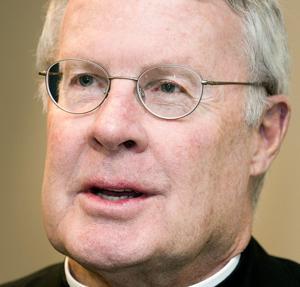|
Catholic abuse victims advocate says Sioux City parishioners need to stand against abuse
By Mason Dockter
Tim Lennon, the president of the board of the Survivors' Network of those Abused by Priests (SNAP), brought an emotional message to Sioux City Catholic parishioners Saturday afternoon: parishioners need to take control of their churches and the churches' response to sexual abuse. Lennon, now 71 and living in Arizona, said he was raped by the Rev. Peter B. Murphy when he lived in Sioux City in 1960. Memories of the abuse left him with years of depression, anxiety, anger and nightmares. Lennon held a news conference Saturday at the Stoney Creek Inn to call attention to the issue. Approximately 15 people were in attendance. The diocese was made aware of the news conference, according to Diocese spokeswoman Susan O'Brien, "But we were not present at the meeting. Therefore we are not able to comment on what was said or not said today." With the flood of Catholic Church sex abuse allegations in the last few years -- including an October Associated Press story about the Diocese of Sioux City and the alleged abuse of 50 boys by the Rev. Jerome Coyle -- Lennon said the church needs to make some changes. "We've seen more in the last three months of groups of parishioners standing up and saying, 'This has got to end,'" Lennon said. "So we need the parishioners to do that." At the news conference, Lennon said concerned citizens and parishioners should contact Iowa Attorney General Tom Miller, asking for a statewide investigation of the Catholic church. SNAP is "an independent, peer network of survivors of institutional sexual abuse and their supporters" who work to support survivors, protect children and the vulnerable, according to SNAP's website. The organization is asking the federal government for an investigation of the Catholic Church under the provisions of the Racketeer Influenced and Corrupt Organizations Act or RICO act. When Lennon first wrote to the Diocese about his abuse experience in 1996, he said, the response was lackluster. Then-chancellor Kevin C. McCoy wrote, in part, "the whole of our society for years chose to ignore the reality of this social ill. "As to your allegation concerning Father Murphy, all I can offer to you is the information that Father Murphy died in 1980. Hence, it is impossible for us to address this matter with him," McCoy's letter continued. McCoy is now a vicar general in Fort Dodge. One Sioux City Catholic parishioner, Michelle Linden, spoke up at the meeting, saying she has felt silenced when she questioned the Diocese. She later expressed fear of speaking out, saying she's concerned local clergy and congregations won't respond positively. "Both my adult son and I, who have posted things on the Diocese website -- nothing bad, mind you, just questioning -- have both been deleted from the website, and my son's been blocked," she said. Linden remains faithful, though she said the younger generation is turning away from the church due to the lack of transparency about the abuses. No clergy from the Diocese was at the news conference. "Why are they not here?" she asked. "I'm angry that they're not here. I really am." Linden said she's tired of hearing area clergy speak out against gays, adultery and matters of personal morality, while keeping mum about sex abuse committed by church officials. "I have zero doubt in my mind, with Jerry Coyle, that had that AP reporter not uncovered it, we never would've known about it," she said. SNAP continues to call for the resignation of Cardinal Daniel DiNardo, currently the head of the U.S. Conference of Catholic Bishops and formerly a Sioux City Bishop. Lennon said DiNardo was fully aware of the allegations against not only Murphy, but also Coyle and the Rev. George B. McFadden, who was sued, along with the Diocese, by a victim 15 years ago. Several attendees were upset about the statute of limitations, which runs out long before many victims ever say anything about their abuse. Lennon suggested lengthening the statute of limitations is a possible legal solution being explored in other states. "When a survivor comes forward, a lot of times, you're the first person they've ever told. And as I said, most never come forward," Lennon said. "I had a guy that's 90 years old, told me it was the first time he'd told somebody." Sioux City attorney R. Scott Rhinehart said he's been in talks with Iowa State Sen. Jim Carlin, R-Sioux City, who has expressed interest in lengthening Iowa's statute of limitations in hopes of taking legal action against the Diocese of Sioux City. "In every situation, they rely on the statute of limitations," Rhinehart said of the Diocese. "They deny it happened, they rely on the statute of limitations. And so they never really confront the issue. They avoid the issue, they deny the issue, they call the victims liars." Lennon may return to Sioux City once the Diocese releases its list of priests who have been credibly accused of sexual abuse in the Sioux City Diocese. The Diocese originally planned to release the list by the end of 2018. Anyone who wishes to come forward to report abuse, even if the statute of limitations has passed, should ideally file a report with the police, Lennon said. "Even if the statute of limitations does not allow them to do a criminal or civil response to their abuse, it provides a written record," he said. "Another survivor may come a year later or two years later and say, 'I was abused by the same priest.' And the previous report may serve to substantiate." Contact: mdockter@siouxcityjournal.com
|
.
Any original material on these pages is copyright © BishopAccountability.org 2004. Reproduce freely with attribution.
